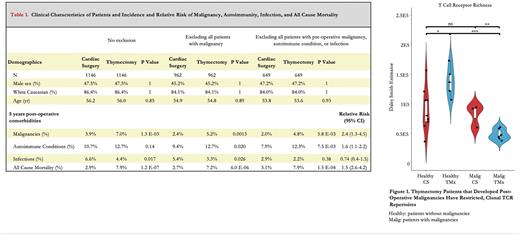Abstract

The function of the thymus in the adult immune system is unclear. Routine removal of the thymus is performed in a variety of surgeries in children and adults. We hypothesized that the adult thymus may be needed for sustaining immune competence against infection, malignancy, and autoimmune disease.
To evaluate the importance of the adult thymus in the prevention of infection, malignancy, and autoimmune disease (IMA), we analyzed differences between 1146 Mass General Brigham (MGB) patients thymectomized as adults against 1146 age, race and sex-matched control patients from MGB that underwent cardiac surgeries. We performed Kaplan-Meier analysis of mortality after controlling for both pre-operative and post-operative IMA diagnoses. We conducted sub-group analyses of these cohorts through manual chart review to contrast severity, diversity, and recurrence of IMAs. We also studied T cell populations in 22 thymectomy (TMx) and 19 cardiac surgery (CS) patients from this cohort by flow cytometry immunophenotyping, in vitro T cell receptor (TCR) stimulation, and bulk CD8+ TCR sequencing.
Compared to their CS controls, TMx patients were more prone to malignancies (4.8% vs 2.0%; odds ratio: 2.4, 95% CI 1.3-4.5), and autoimmunity (12.3% vs 7.9%; odds ratio: 1.6, 95% CI 1.1-2.3), and had a higher rate of mortality (7.9% vs. 3.1%; odds ratio: 1.5, 95% CI 1.7-4.9) after 5 post-operative years. TMx patients suffered from more malignancies and autoimmunity regardless of their history of thymoma. Cause of death analysis after 10 post-operative years demonstrated that the events leading up to the death of CS patients were largely due to cardiac etiologies, whereas TMx patients suffered from IMA that directly contributed to their death. Amongst patients that developed post-operative malignancies, TMx patients developed more malignancies than CS patients (mean 1.7 vs 1.2, p=0.001). Whereas 64.8% malignancies developed by CS patients were skin-related, only 45.8% of the malignancies developed by TMx patients were skin-related - the remaining 54.2% represented malignancies from almost every major organ system in the body. The breast cancers developed by TMx patients were of higher pathologic grade than those of CS patients (2.2 vs 1.6, p = 0.046). The gastrointestinal, genitourinary, and hematologic malignancies developed by TMx patients were more frequently widespread in the body (57.7% vs 18.8%, p = 0.015). Following treatment, TMx malignancies recurred at significantly higher rates than CS malignancies, regardless of tissue type (16.7% vs 4.6%, p < 0.001).
TMx patients developed more autoimmunity on average versus CS patients (1.81 vs 1.16, p < 0.001). The percentage of TMx patients with systemic autoimmunity was almost three times that of the CS group (68.0% vs 25.7%, p < 0.001). Autoimmune diseases developed by TMx patients affected tissues throughout the body and were more diverse than those of CS patients.
These clinical outcomes were associated with evidence that thymectomy compromises multiple aspects of T cell function. The proportions of peripheral blood T cells were distorted, with fewer CD4+ Th cells (63.9% TMx vs 86.5% CS; p = 0.038) and more CD8+ lymphocytes (30.6% TMx vs 11.0% CS; p = 0.021). Notably, thymectomized adults had an expanded subset of pro-inflammatory, naïve CD8+ T cells that expressed CXCR3 and CD49d (8.6% vs 3.0%; 95% CI 1.58-9.53). Additional functional analysis revealed that CD4+ and CD8+ T cells from TMx patients responded differently to in vitro activation. While the CD8+ compartment was sluggish in its response, CD4+ T cells from the TMx group were hyperproliferative. The plasma cytokine signature of TMx patients further supported the notion of a dysfunctional Th cell population with significantly elevated levels of Th2 (IL33 and TSLP) and Th17 (IL23) promoting factors. Excessive Th2 or Th17 stimulation has been experimentally associated by others with autoimmunity and impaired tumor surveillance, similar to what was found in thymectomized patients. Finally, the TCR repertoires of TMx patients who developed malignancies were more oligoclonal (Daley Smith Estimator of 4.8e4 vs 8.2e4; 95% CI 1.2e4-5.5e4) than those of CS patients who developed malignancies.
The thymus remains important for adult immune function and has a role in the prevention of malignancy, autoimmunity, and mortality. These adverse consequences of thymic loss should be considered when contemplating thymectomy.
Disclosures
Sykes:Clear Creek Bio: Current holder of stock options in a privately-held company. Scadden:Fog Pharma: Consultancy; Fate Tx: Current equity holder in publicly-traded company; Editas Tx: Current equity holder in publicly-traded company, Membership on an entity's Board of Directors or advisory committees; Clear Creek Bio: Current equity holder in private company, Membership on an entity's Board of Directors or advisory committees; Magenta Therapeutics: Current equity holder in publicly-traded company, Membership on an entity's Board of Directors or advisory committees; Inzen: Consultancy; LifeVaultBio: Current holder of stock options in a privately-held company, Membership on an entity's Board of Directors or advisory committees; Agios Tx: Current equity holder in publicly-traded company, Membership on an entity's Board of Directors or advisory committees; VCanBio: Consultancy; Dianippon Sumitomo Pharma: Research Funding.
Author notes
 This icon denotes a clinically relevant abstract
This icon denotes a clinically relevant abstract
Asterisk with author names denotes non-ASH members.


This feature is available to Subscribers Only
Sign In or Create an Account Close Modal